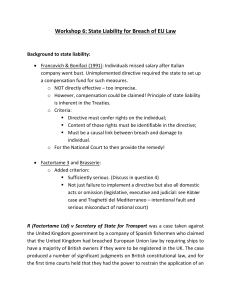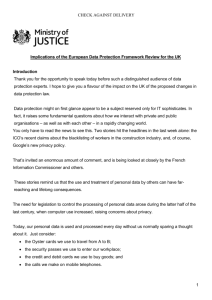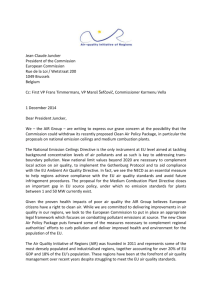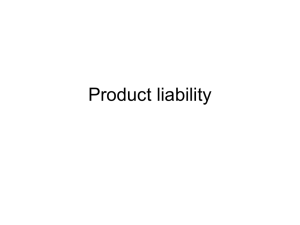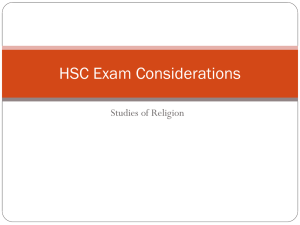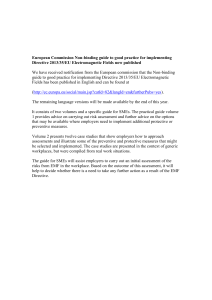Lecture 01.11.2011
advertisement
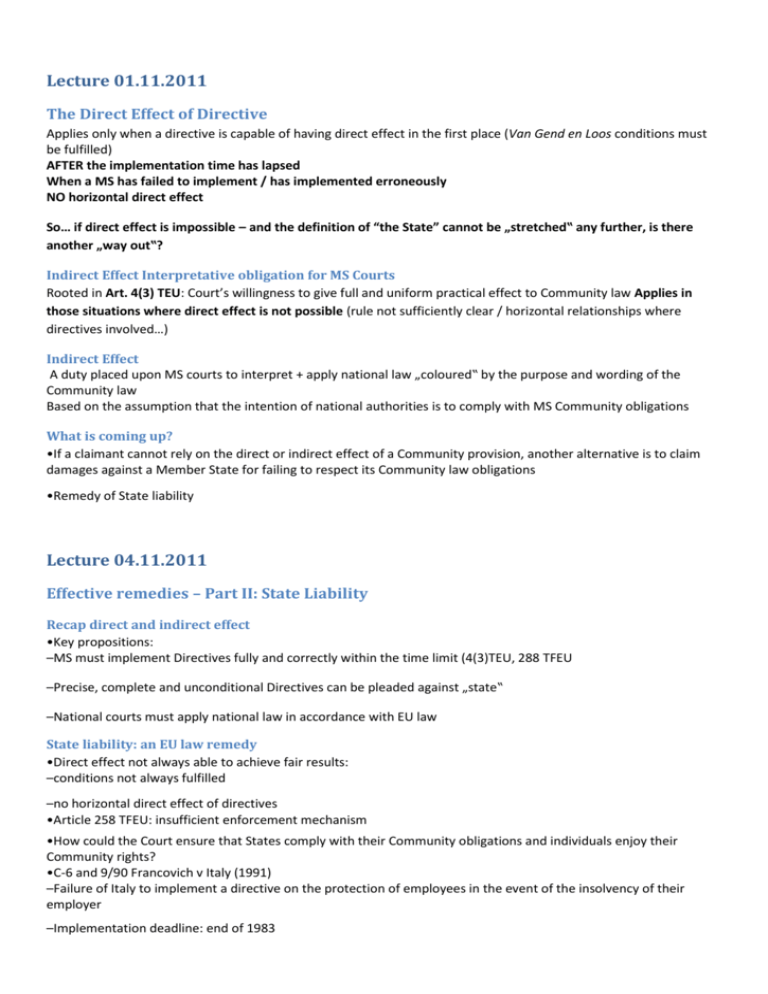
Lecture 01.11.2011 The Direct Effect of Directive Applies only when a directive is capable of having direct effect in the first place (Van Gend en Loos conditions must be fulfilled) AFTER the implementation time has lapsed When a MS has failed to implement / has implemented erroneously NO horizontal direct effect So… if direct effect is impossible – and the definition of “the State” cannot be „stretched‟ any further, is there another „way out‟? Indirect Effect Interpretative obligation for MS Courts Rooted in Art. 4(3) TEU: Court’s willingness to give full and uniform practical effect to Community law Applies in those situations where direct effect is not possible (rule not sufficiently clear / horizontal relationships where directives involved…) Indirect Effect A duty placed upon MS courts to interpret + apply national law „coloured‟ by the purpose and wording of the Community law Based on the assumption that the intention of national authorities is to comply with MS Community obligations What is coming up? •If a claimant cannot rely on the direct or indirect effect of a Community provision, another alternative is to claim damages against a Member State for failing to respect its Community law obligations •Remedy of State liability Lecture 04.11.2011 Effective remedies – Part II: State Liability Recap direct and indirect effect •Key propositions: –MS must implement Directives fully and correctly within the time limit (4(3)TEU, 288 TFEU –Precise, complete and unconditional Directives can be pleaded against „state‟ –National courts must apply national law in accordance with EU law State liability: an EU law remedy •Direct effect not always able to achieve fair results: –conditions not always fulfilled –no horizontal direct effect of directives •Article 258 TFEU: insufficient enforcement mechanism •How could the Court ensure that States comply with their Community obligations and individuals enjoy their Community rights? •C-6 and 9/90 Francovich v Italy (1991) –Failure of Italy to implement a directive on the protection of employees in the event of the insolvency of their employer –Implementation deadline: end of 1983 –Plaintiffs were owed arrears of wage –Employers insolvent –Plaintiffs sought compensation and sued the Italian State •Two heads of claim: –direct effect –State liability •… C-6 and 9/90 Francovich v Italy (1991) •The directive was not sufficiently precise to have direct effect •However, the Court accepted the principle of State liability •New remedy wholly independent of the principles of direct and indirect effect, even though the remedy will often be used when direct and indirect effect are not available •… C-6 and 9/90 Francovich v Italy (1991) •reliance on EU law before national courts •a person has been adversely affected by the failure of a MS to comply with its EU law obligations •It is subject to conditions Francovich conditions •The Directive grants rights to individuals •It must be possible to identify the content of those rights •There must be a causal link between the breach of the State‟s obligation and the loss and damage suffered by the injured parties State liability: an EU law remedy •… C-6 and 9/90 Francovich v Italy (1991) •Decision largely based on the Court‟s previous case law: Van Gend en Loos, Simmenthal, Factortame I… •Key notion of effectiveness •Reliance also on Article 4(3) TEU (duty of loyal cooperation): MS must give practical effect to Community law •Importance of the remedy confirmed in subsequent cases •Principle of potentially great significance •BUT three questions left unanswered: –can the principle apply to any breach of EU law for which a MS is responsible or only in relation to the nonimplementation of directives? –should such a breach be culpable? –is the principle restricted to actions for damages, or may other remedies be claimed? •Subsequent cases provided the answers •C-46 & 48/93 Brasserie du Pêcheur and Factortame III (1996): –Treaty provisions infringed: Article 34 TFEU (Brasserie) and Article 49 TFEU (Factortame III) –Judgments on the incompatibility with EU law of German and British law respectively •A MS can be liable even if the provisions in question is directly effective (a fortiori) •In its judgment, the ECJ insisted on: –the effectiveness of EU law –Article 340 TFEU (parallel drawn between the liability of Community institutions and of MS) •… C-46 & 48/93 Brasserie du Pêcheur and Factortame III (1996) •3 conditions must be fulfilled: –the provision must confer rights on the individual –the breach must be sufficiently serious –there must be a causal link between the breach and the damage suffered by the individual •… C-46 & 48/93 Brasserie du Pêcheur and Factortame III (1996) •Second condition: the decisive test is whether the MS manifestly and gravely disregarded the limits on its discretion •Non-exhaustive list of factors (at par. 56): –clarity and precision of the rule breached –measure of discretion enjoyed by the State –whether the infringement was intentional or involuntary –whether any error of law was excusable or inexcusable –the fact that the position taken by a Community institution may have contributed to the omission –adoption or retention of incompatible national measures •… C-46 & 48/93 Brasserie du Pêcheur and Factortame III (1996) •Third condition: for national courts to decide •These 3 conditions are necessary and sufficient under EU law •!!! Fault may be relevant in assessing whether the breach is sufficiently serious, but it does not however constitute a supplementary condition Not sufficiently serious breaches •Ex. 1: C-392/93 BT (1996) –Incorrect transposition in the UK of a Directive on public procurement –UK not liable. Good faith because: •imprecise wording of the Directive •no guidance given by the Court •or by the Commission –Wide margin of discretion = no liability •Ex. 2: C-283/94 Denkavit (1996) –Same reasoning in relation to the defective implementation by Germany of a directive on company taxation Sufficiently serious breaches •Ex. 1: C-190/94 Dillenkofer (1996) –Failure of Germany to implement the Package Travel Directive –If a MS fails to make any effort to implement a Directive, then it is deemed to be a sufficiently serious breach •Ex. 2: C-5/94 Hedley Llomas (1996) –Refusal of the UK to grant licences for the export of live sheep to Spain –Existence of an EU Directive on the stunning of animals before slaughter –The Court decided that it was impossible for the UK to invoke Art. 35- 36 TFEU: a harmonising directive occupies the field; no discretion left to MS to rely on general Treaty provisions Who can be held liable? The State •C-424/97 Haim (2000): –a public law body may, in addition to the MS itself, be liable for reparation for loss and damage caused to individuals as a result of measures which it took in breach of EU law –a MS may not escape liability by pleading the distribution of powers and responsibilities as between the bodies which exist within the national legal order or by claiming that the public authority responsible for the breach of Community law does not have “the necessary power, knowledge, means or resources” Who can be held liable? The State •What about national courts? •C-224/01 Köbler (2003): –the principle that Member States are obliged to make good damage caused to individuals by infringements of EU law for which they are responsible is also applicable where the alleged infringement stems from a decision of a court adjudicating at last instance –however, note the limitations •Confirmed in C-173/03 Traghetti del Mediterraneo (2006) State liability and national procedural autonomy •Principle of national procedural autonomy: –in the absence of Community harmonisation on remedies / procedures, it is up to each MS to determine the remedies which can be obtained through national courts, following national procedures laid down by national law •Two limits: –Equivalence: rules protecting Community rights must not be less favourable than those applicable to similar actions based on national law –Effectiveness: remedies must be sufficient to compensate and deter (adequate, proportionate…) Example of C-271/91 Marshall II (1993): •Marshall I (1986) •Pb.: under UK law, she could only be awarded damages capped at a low level •Held: “Although the Directive leaves Member States, when providing a remedy for breach of the prohibition against discrimination, free to choose between the different solutions suitable for achieving the objective of the Directive, it nevertheless entails that if financial compensation is to be awarded where there has been discriminatory dismissal in breach of Article 5 TEU, such compensation must be adequate, in that it must enable the loss and damage actually sustained as a result of the discriminatory dismissal to be made good in full in accordance with the applicable national rules.” State liability and national procedural autonomy •The principle of State liability limits national procedural autonomy •However, MS retains some discretion as to the procedures and the remedies applicable even in the context of a State liability action •Clear from the judgment in Brasserie du Pêcheur and Factortame III, and subsequent case law
